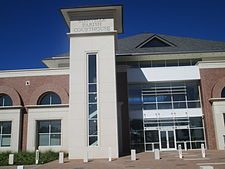Bienville Parish, Louisiana
| Bienville Parish, Louisiana | ||
|---|---|---|

The new Bienville Parish Courthouse building in Arcadia is located to the north of Interstate 20.
|
||
|
||
 Location in the U.S. state of Louisiana |
||
 Louisiana's location in the U.S. |
||
| Founded | March 14, 1848 | |
| Named for | Jean-Baptiste Le Moyne de Bienville | |
| Seat | Arcadia | |
| Largest town | Arcadia | |
| Area | ||
| • Total | 822 sq mi (2,129 km2) | |
| • Land | 811 sq mi (2,100 km2) | |
| • Water | 11 sq mi (28 km2), 1.3% | |
| Population (est.) | ||
| • (2015) | 13,786 | |
| • Density | 18/sq mi (7/km²) | |
| Congressional district | 4th | |
| Time zone | Central: UTC-6/-5 | |
Bienville Parish (French: Paroisse de Bienville) is a parish located in the northwestern portion of the U.S. state of Louisiana. As of the 2010 census, the population was 14,353. The parish seat is Arcadia.
The highest natural point in Louisiana, a hill known as Mt. Driskill, 535 feet (163 m) in elevation, is located in north central Bienville Parish. The mountain is located on private land with public access by walking trail. It is named for James Christopher Driskill, a 19th-century landowner. Nearby is Jordan Mountain, with an elevation of 493 feet (150 m).
Lake Bistineau and Lake Bistineau State Park embrace parts of Bienville and neighboring Webster and Bossier parishes.
In the 1830s, Ruben Drake moved his family from South Carolina to what he named Mount Lebanon, the first permanent settlement in the parish. As the Drakes were devout Baptists, they established a church and school, which evolved into Mount Lebanon University, the forerunner of Louisiana College in Pineville in Rapides Parish in Central Louisiana.
On March 14, 1848, the Louisiana State Legislature created Bienville Parish from the lower portion of Claiborne Parish. Bienville Parish was named in honor of the French Canadian explorer Jean-Baptiste Le Moyne, Sieur de Bienville, who was governor of French Louisiana for a total of thirty years.
...
Wikipedia

